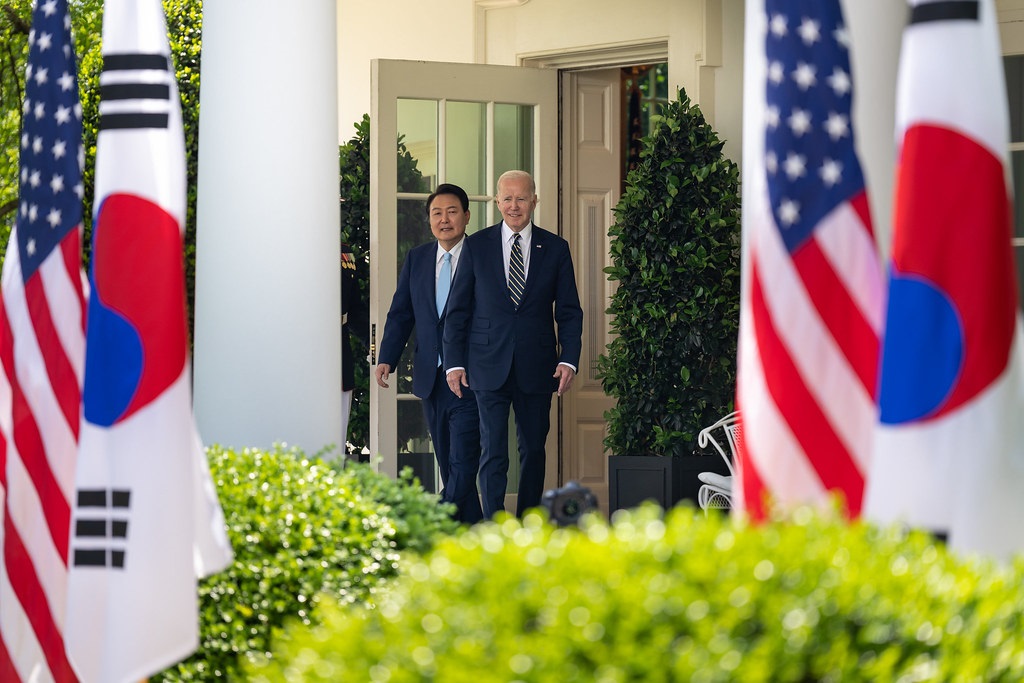The Peninsula
2023 in Review: The War in Ukraine and South Korea’s Increasingly Complex National Security

The war in Ukraine directly and indirectly impacted policy and perceptions on and around the Korean Peninsula, starting with Russia’s invasion in early 2022 and continuing apace in 2023. Although the war has provided Seoul the opportunity to enhance its contributions to global security, simultaneously it presents challenges that accelerate its security concerns closer to home and raise worrisome questions about the state and future of the U.S.-ROK alliance.
Amidst the war, Seoul confronts a fraying nuclear order and the emergence of a new, far riskier one – manifest not only in Putin’s actions and rhetoric in Ukraine but in North Korea’s more offensive declaratory policy and unmitigated capability advancements – and doubts about the credibility and capacity of U.S. extended deterrence guarantees. Early this year, such doubts increased talk of Seoul’s nuclear armament – a once relatively fringe idea – among ROK politicians and defense analysts and President Yoon Suk Yeol himself. Such talk spurred U.S.-ROK alliance efforts to reenergize existing consultative bodies and establish new ones (i.e. the Nuclear Consultative Group or NCG) to reassure Seoul and increase its participation in the planning and operation of the U.S. extended deterrence commitment.
However, such efforts to reassure Seoul and deter Pyongyang have been met by abiding skepticism among some conservatives in Seoul, whose voices will only increase in the wake of the continued advancement in Pyongyang’s capabilities, which shows absolutely no sign of abating. Meanwhile, Yoon’s political opposition views the measures taken – from the increased scale and scope of alliance military exercises and U.S. strategic asset deployments to tighter trilateral U.S.-ROK-Japan relations – as heightening tensions with North Korea and hardening geopolitical lines vis-à-vis China, reducing ROK autonomy and harming its interests.
Even for those supportive of such alliance efforts, there is distinct concern about their sustainability in the face of Donald Trump’s potential return to office. As support for Ukraine declines among the American public in general and among Republican lawmakers and their standard-bearer, Trump, in particular, there are calls to quickly institutionalize the NCG so that Trump’s reelection won’t undermine it. However, institutionalization takes years, and Trump doesn’t care for institutions. Additionally, under Trump, the current Special Measures Agreement (SMA) between Washington and Seoul is up for renegotiation in 2025. We’ve seen Trump’s inordinate demands on alliance cost sharing with South Korea before. There is no reason to believe it would not be the same, if not worse, in a second term.
Further driving concerns (despite Trump’s denials) is a recent report indicating he may be willing to adopt a negotiation plan under which North Korea freezes its nuclear program and stops building new weapons in return for sanctions relief and other incentives, with denuclearization to be left as a distant goal. The motivation would be to focus, instead, on “the larger task of competing with China.” In short, such developments portend a possible scenario wherein Seoul is left with a denuded NCG as Washington cuts a deal with a still nuclear-armed North Korea, while being thrust into a deepening U.S.-China rivalry.
Finally, the war in Ukraine quickened Washington’s effort to build the connective tissue between the Euro-Atlantic and Indo-Pacific security and persuade allies and partners to do the same. In this context, Seoul followed the trend by gradually adopting a more outspoken position regarding the importance of peace and stability in the Taiwan Strait and framing it in increasingly expansive terms—as a regional and global issue yet also directly linked to the peace and stability of the Korean Peninsula, igniting Beijing’s ire in the process. Also, despite its initial protestations early this year that it could not provide direct lethal aid to Kyiv, by year’s end Seoul reportedly had – through its indirect sales to the United States – supplied more artillery ammunition for Ukraine than all European nations combined. Such support may very well have helped motivate Moscow to lean more openly and concertedly toward Pyongyang, thus further complicating Seoul’s national security environment.
Yet as U.S. political support and by extension economic and military support for Ukraine shows signs of wanning – matched by similarly decreasing support from various corners in Europe – Seoul may begin to wonder why it should continue to provide such large amounts of ammunition, especially as it faces a worsening North Korean threat, sharpening dilemmas surrounding U.S.-China economic security competition, and a potentially less credible or consistent American ally depending on how the 2024 U.S. Presidential election plays out.
Given such developments, Seoul may feel the need to hedge. Indeed, ROK Foreign Minister nominee Cho Tae-yul recently noted Seoul’s “relations with China are as important as our alliance with the United States” and that “the pendulum might have swung too much” toward Washington and Tokyo when the Yoon administration took office. At the very least, such remarks seem to indicate that Seoul’s much touted shift from strategic ambiguity toward strategic clarity has reached its limits and that the trends created or accelerated by the war in Ukraine have contributed to a recalibration. What remains very unclear, though, is how such trends will play out in the coming year.
Clint Work is a Fellow and Director of Academic Affairs at the Korea Economic Institute of America. The views expressed here are the author’s alone.
Official White House Photo by Adam Schultz from White House flickr photostream.
